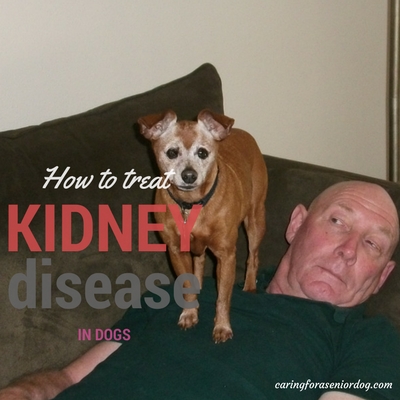
We understand what kidney disease in senior dogs is, and how it is diagnosed. Now we are going to discuss the various treatment options available, to manage it as best we can.
Treatment options for acute renal failure (ARF)
We know that acute kidney disease comes on quite suddenly. The cause could include leptospirosis, a parasite, eating foods dangerous to dogs, or drinking antifreeze.
IV fluids are given, at your vet clinic, over the course of several hours to rehydrate your dog, and flush out whatever the kidneys would have been removing from the blood.
It is often enough to get urine output going, or increasing again, but if not, medication may be needed.
Being dehydrated may have put your dog off eating, so this should help get his appetite back.
Nutrition
As your dog starts to rehydrate, his nausea will dissipate and he will be more interested in his food.
Lower amounts of higher quality protein will limit the demands on the kidney, as will smaller, more frequent meals.
Other treatments
- In addition to fluids, treatment (which is often antibiotics, or even antacids) will begin to tackle the underlying cause.
- Very high blood pressure could develop, causing blood vessels in the eye or brain to burst. Blood pressure medication will be needed to control it quickly.
- Dialysis, if available in your area, may be an option for dogs that don’t respond to other treatments.
- In very desperate situations, a transplant may be the only option, and are performed at a few veterinary hospitals.
With early and aggressive treatment, acute renal failure may be reversible.
Treatment options for chronic kidney failure (CKD)
Seems obvious to say, but I will anyway… treatment depends on test results, and is, ideally, linked to the stage of disease.
In some extreme cases, the problem is caught too late for any treatment to be an option. However, if the disease is caught early enough, many dogs can live months, even years.
For mild cases
For dogs who are still eating and not showing severe signs, a conservative approach is usually taken. Your vet will monitor your dog on a regular basis to catch any changes early, and make adjustments as symptoms develop.
For dogs who aren’t doing well
For dogs who aren’t doing as well, IV fluids are given to flush out the waste that has built up, which should help your dog feel less nauseous, and more interested in eating.
As the disease progresses, and the need for additional fluids increases, subcutaneous fluids can be given at home. Your vet will show you how.
I had to do it for one of my cats whose kidneys were failing. I must admit I was very squeamish, but managed to do it. I hung the bag from a kitchen cabinet, and stood her on the counter.
Once your dog is hydrated, your vet may recommend adding electrolyte crystals to his drinking water, to replace what’s being peed away. I add it to Red’s water once a week, and she’s fine with it. Don’t worry if you have other dogs in the house drinking from the same bowl, it won’t harm them. That’s what my vet told me, confirm it with yours!!
Controlling nausea, vomiting and diarrhea
This is something you must stay on top of, and that means letting your vet know right away. Senior dogs can get dehydrated very easily, and that can be dangerous.
Nausea may come and go, so small meals offered throughout the day may increase the amount of food eaten.
Your vet can give your dog a shot of anti-nausea medication, which is fast acting. He may also send you home with some tablets, just in case.
I keep medication on hand for when Red gets diarrhea. I still call the vet, but if I can’t reach him right away, I don’t worry because I’m doing what he would recommend, and not losing precious time in starting treatment. If he still wants to see her, I bring her in.
Believe me, I know it’s a pain having to wake up to take your dog out in the middle of the night, I’ve done it! That is, until I discovered the beauty of pee pads. Now if Red has to go, she goes and doesn’t have to tell me about it.
Please be advised, if you have done, or are considering withholding water overnight, don’t! It will not decrease the number of times he has to pee, but it can be very dangerous.
Because dogs with kidney disease cannot conserve water by making concentrated urine, water is very important in preventing dehydration. Your dog should always have plenty of fresh water available, and report any changes in amount your dog is drinking to your vet, immediately.
If your dog is not eating well, or is vomiting, he may not be getting enough water. Adding some low sodium broth may improve the palatability of the food, but ask your vet what ingredients can be used to make it.
Diet (food and treats)
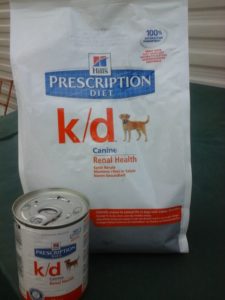 Dietary management has been shown to reduce the progression of CKD, reduce complications associated with it, and increase life expectancy.
Dietary management has been shown to reduce the progression of CKD, reduce complications associated with it, and increase life expectancy.
Kidney disease appropriate food is the key to that
- It has higher quality, lower amounts of protein, creating less waste, and less work for already impaired kidneys.
- It contain less phosphorous, which accumulates in the blood when the kidneys are diseased.
- It decreases the amount of nitrogenous waste delivered to the kidneys for excretion in the urine. This may help reduce excessive drinking and peeing.
- Less protein may also help reduce the degree of anemia in some patients – anemia enhances the weakness and reluctance to eat in animals with renal failure.
- Kidney diets contain increased amounts of water soluble vitamins, which are lost due to increased peeing, so additional vitamins do not need to be given.
- Sodium is restricted in kidney diets, because diseased kidneys are less efficient at regulating it.
All diets are not created equal
In my experience, and I’m sure many of you can relate to this, not every dog will tolerate a brand as well as others might. My dog Red can attest to that.
My vet’s office changed the brand of food they recommend (and that she had eaten many times before and never had a problem with), so we ordered it. What a disaster!
She got so sick, threw up, had diarrhea, had a mini seizure (related to her vomiting, but don’t recall what the vet called it). It was awful. I think that brand contained very high levels of fish oil, which her body couldn’t tolerate.
Thankfully she was good as new in a short period of time.
Red has been on a kidney diet for several weeks now, and it has definitely made a big difference. Her test results have been good, so the treatment plan is working.
What I’m doing for Red at the moment
I add rice, spinach, squash, carrots and sweet potato to Red’s food. Not all at the same time though! I just made chicken soup with vegetables to improve the palatability of her dog food, and feeding the chicken to my other dog. I did this because she has had trouble eating the last couple of days. It turns out she picked up an infection, and wasn’t feeling great. New medication to fight the infection, and the soup added to her food is helping.
I also feed her smaller meals, more often. Her kidneys don’t work as hard, she’s on quite a bit of medication so it enables me to spread them out, and she’s happy because she loves to eat!!
UPDATE!! JANUARY 13, 2017
We are all now living in Spain for a few months, and for a couple of years now I’ve wanted to take Red to see a holistic vet. I never had the opportunity until we came here, so two weeks ago we made the 1 hr and 15 minute journey to see a holistic vet in Malaga. The name of the practice is called VetYVet and Dr. Ortega is amazing. We were there yesterday getting test results back for Red, and to discuss medications and diet. For the sake of this article I will only address the diet. My UK vet is of the belief that kidney disease=no (a tiny bit) of protein and a kidney prescription diet. Dr. Ortega has recommended a home cooked diet for Red, which he tailor made specifically for her. It consists of precise measurements of chicken, quinoa, brown rice, olive oil, broccoli, carrot and apple. I’m making it for the first time today and looking forward to see how she reacts. For the past couple of weeks she’s had mostly white rice, chicken and carrots with just a little bit of kidney diet and she’s been so much happier. I’ll keep you posted.
Changing over to new food
Let me remind you, when changing your dog’s food, do it over the course of about a week. At each meal, add a little bit more of the new food, until he’s totally switched over.
Treats and other additions
Treats and other additions to your dog’s diet may contain high amounts of sodium, and other ingredients that are no longer allowed. Your vet will advise what is, and is not, okay to eat. Ask him about safe fruits and vegetables too!
There are lots of homemade dog treat recipes easy enough to make, just do an internet search, and I know there are lots on Pinterest.
Lack of appetite
Nausea and lack of palatability can lead to a sick dog not eating well, which is not a good thing. Like I mentioned earlier, this has happened to Red over the past couple of days. I took her to the vet, and it seems she picked up an infection.
She received a shot of anti-nausea medication and an antibiotic, and I made chicken soup with vegetables. That combination is helping her get her appetite back. The chicken I’m giving to my other dog.
Speak to your vet for advice, because this is not something you can just “wait and see” what happens.
Kidneys filter phosphorous out of the body, but when the kidneys aren’t working well, it starts to accumulate in the blood, causing lethargy and poor appetite.
A kidney diet helps for a time, but as the disease progresses, some additional help in the form of a phosphate binder may be prescribed. It works by preventing the phosphate from being absorbed into the blood.
I spoke to my vet about it for Red, but she’s still doing well enough so there’s no need, which is very good news.
Calcium and phosphorous supplementation
While phosphorous levels typically increase, calcium concentration may increase, decrease or remain normal.
Phosphorous and calcium are controlled by the parathyroid hormone. The increase in phosphorus stimulates the parathyroid gland to increase the blood calcium level, which is does by removing it from bones, which can make them brittle and easily broken.
Medication may be given to reduce the function of the parathyroid gland.
Potassium
Potassium depletion is common because less is being taken in when a dog is not eating well, and more is lost through increased peeing. Having said that, some dogs will show elevated levels.
Your vet will monitor concentrations in the blood, and take appropriate action when needed.
Avoid stress
Keep your dog calm, and his environment as stress free as you can. A stressed dog may not eat or drink as much as they should, and that could be dangerous.
Infection
If the urine shows signs of infection, or a urine culture grows bacteria, antibiotics may be necessary.
Several weeks ago Red was drinking and peeing even more than usual. You can imagine how worrying that is in a dog with kidney disease. It turned out to be a urinary tract infection, and she was put on a two week course of antibiotics.
High blood pressure
Many pets with CKD have high blood pressure, and it should be monitored to prevent further kidney damage. In those instances, medication will most likely be needed. Blood pressure can be difficult to measure in many dogs, basically because they can’t sit still.
Omega 3
Omega-3 fatty acid supplements may help improve kidney function.
Anemia
Erythropoietin is a hormone produced by the kidneys to stimulate the bone marrow to produce red blood cells. Since many dogs in kidney failure cannot produce that hormone, they have anemia – a low red blood cell count. Synthetic erythropoietin may be used to stimulate the bone marrow.
How to treat kidney disease in dogs – conclusion
I know it can be tough reading these types of articles, knowing your dog isn’t well. Believe me, it isn’t easy writing them, especially as I write about a lot of what my own dog is going through.
But what else can we do? We have to make every effort to care for our dogs the best way we know how, and if I can help you do that through this website, and my own experiences, than I’m happy.

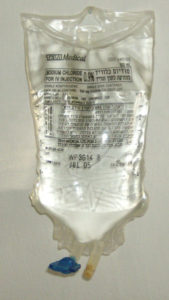
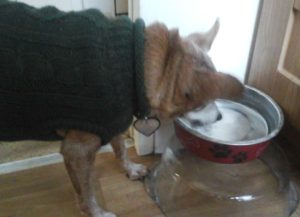
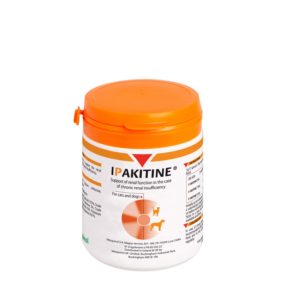
 Best Christmas Gifts for Dogs
Best Christmas Gifts for Dogs
Sorry to hear about your dog. Sounds like he’s having a rough time. I don’t have a dog but this treatment doesn’t sound too different from what we do for people with kidney issues (I’m a nurse). Interesting read. Feel better Red!
Hi Karen, thanks very much for the comment. Red does have some issues, but thanks to an excellent vet she’s doing very well. I’ve had many people say that the symptoms and treatments are similar to humans. Not surprising I guess, considering how many human medications are also used for dogs. I appreciate the good wishes for Red.
I have a dog, a Jack Russell and he’s getting on age also so love to read your block. He is a handful but lol he’s family.
Hi Ron, thank you very much for the comment. I keep adding content at least twice a week, so hopefully you will find information that’s helpful. Of course if you have any questions, feel free to contact me anytime and I’d be happy to help. They definitely can be a handful as they get older, but like you say, they’re family.
Wow! My senior dog doesn’t have kidney disease. My question is about the doggy pads. I’ve noticed that Baby needs to be let out more at night to go. Fortunately I’m not the one she wakes up. But in the event I am I’m considering doggy pads. My concern is if it will smell up my room. I have a sensitive nose and so any bad smell and I notice it even in my sleep. How well do the doggy pads you use absorb the urine and smell?
Thanks
Rawl
Hi Rawl, I appreciate you taking the time to leave a comment. Glad to hear Baby doesn’t have kidney disease. Do you know why she needs to go out more these days? Have you taken her to the vet? I don’t have any complaints about the pee pads I use. They absorb really well, don’t leak and I don’t tend to smell anything. Having said that, I know a bit about sensitive noses. I was driving with my brother in law on the highway, and I’m not joking – he smelled a cigar someone was smoking a few cars in front of us, in the winter, windows up. That is a sensitive nose so if you’re like him, I can’t guarantee you won’t smell anything. I assume Baby sleeps in your room then?
Hindy, Red has a very loving human being caring for him and I know he is thankful. Has he been in your family a long time? Your article is full of a lot of very helpful material for people with sick animals. Thank you for being so caring.
Hello Diane, thanks for your comment. Red is a girl – I want to say everyone thinks she’s a boy because of her name, but even if I put a pink coat on her and use a pink leash, they still think she’s a boy. Oh well!! We adopted her just over 6 years ago, and we were told she was 8 but who knows how old she really was. My goal is to provide as much helpful information as I can, for people caring for senior dogs.
My dogs just been diagnosed with kidney disease he’s on tablets and got to go on reanal diet he’s coming up to 15 but seems happy still eating ok and drinking water since he’s been on tablets he’s not peeing as much in the house and the drinking has carmed down is this normal for my dog am so worried about him
My dog had kidney issues for many years and they were very well controlled with a prescription diet. I’m glad he’s still eating and drinking and not peeing so much in the house is a great thing!! I used to keep pee pads on the floor to stop any accidents. Of course you’re worried but just monitor him and if you notice any changes let your vet know. Have you joined my FB group? It’s called Senior Dog Care Club and you’ll find lots of support there.
my dog has just had his kidney flushed when he come back from the vets its took the stuffing out of him he has no energy the food the vet give looks rotten
Oh my goodness poor baby! That doesn’t sound good the food looking rotten. I hope you spoke to your vet about that.
Great article this. My 6 year old Shar Pei boy has been diagnosed. He responds well to IV fluids and has started his renal diet pronefra supplement. It’s such a worry isn’t it. X
I’m sorry to hear that Darren, but glad to hear fluids are helping. My dog did very well on her kidney diet so hopefully it will help keep things under control for your pup as well.
Did you feel that the Hill prescription diet helped your dog? I know you said you’ve started a more holistic approach. We just found out yesterday that my dog’s kidneys aren’t doing what they’re supposed to and they put him on the Hill kidney care food. He doesn’t seem to care for it much, but I haven’t done enough research to know exactly what to supplement with to get him to eat.
Hi Emily, I have a fabulous vet and he did believe that K/D helped tremendously. I found baking it made a difference in terms of how appetizing it was and would also use it as treats when she wasn’t eating well enough. Other times I would add things like carrot, pieces of raw apple no seeds, some brown rice, squash, green beans, a bit of boiled chicken breast and warmed it slightly in the microwave. Alternatively a holistic vet could help you with a homemade diet that might be more interesting or natural herbs or supplements to boost kidney function. I don’t have experience with anything like that, my holistic vet didn’t live where I did, I found him when we were away for a few months so my association with him was temporary. I hope this helps.
Hello I have a puppy 11 months that was born wi bilateral dyslpasia. We have had,ups and downs but she is still here! Ever since te kidney diet food she got better. Sometimes I give her pedialite and straws of water. She is lethargic and lately moody. Her test results were 4.2 creatine and 89 bun. She is in late stage 3. I have subcaseous fluids. I was giving them sporadically. She still eats and drinks very well. Voracious appetite. But I can tell she is dehydrated. How often do u do the fluids? My vet was not equipped to deal with this.mthey said just make her comfortable. That was 6 months ago. I have taken her to at few other vets and have another appointment next week. I want to make sure she is as comfortable and happy as possible till we have to put her down. Any help is appreciated?
I’m confused by what you’re asking. You say your puppy is 11 months old, but you talk about kidney issues. Can you please explain what you’re asking, I’m afraid it’s not that clear.
My Paris (shetland sheepdog – age 14 yrs 9 months) has advanced kidney disease. She is on many medications and currently on recovery food. She develped diarrhea over the weekend and now has full blown puddle poo. Vet put her on flagyl today for 5 days. She is on puppy pepsid (Flumotidine – spelling?), Azodyl , Dasaquin. and eating Royal Canine Recovery food. (2tsp2X’z) I had chicken/rice for her also as a trial to see how her digestive system reacts. I have a puppy diaper on her all day, and she does tell me when she has to go out. I know that I’m going to lose her probably very soon. I try my best to love on her and keep her comfortable. And yes, I take her outside in the middle of the night, even when it’s cold, wet, rainy etc. She was diagnosed in late August 2019.She is old at her age. And she is a good puppy.,
I’m sorry to hear about Paris, I know how tough it is to see your pup dealing with so many issues. My vet always gave me metronidazole when Red had diarrhea and it worked very well. Did your vet recommend a bland diet for a few days? I used to give Red chicken and rice or white fish. I hope she’s feeling better soon.
Thank you for writing about your dog, Red and her Kidney Disease. Our dog, Barney, who is a Borador [Border Collie/Lab] has Atypical Cushings Disease and was at the vet this morning for a Urine Test. He’s on Royal Canin Hepatic Diet because it has less copper. He has been diagnosed with the beginnings of Kidney Disease. We already had an ultrasound scheduled for him this afternoon with our specialist. They want to see what’s going on inside! I learned a lot from reading this article and will be asking our vets about the Stinging Nettleseeds and the “Chickenless” Vegetable Soup. Barney is 11 1/2, we got him when he was 4.